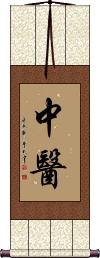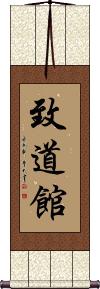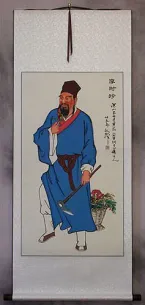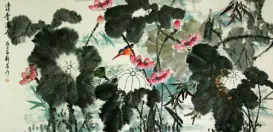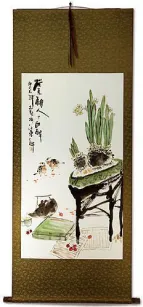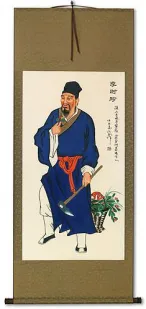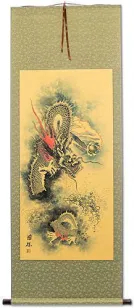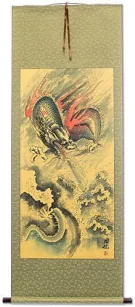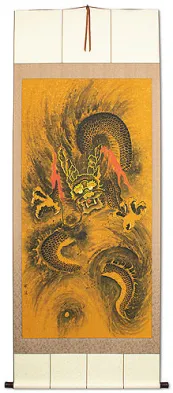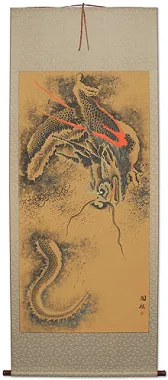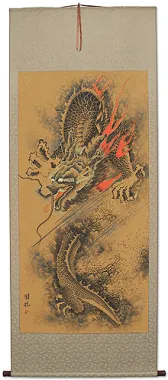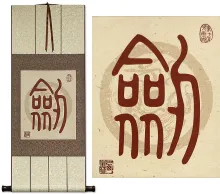Many custom options...
And formats...

Chinese Traditional Medicine in Chinese...
Buy a Chinese Traditional Medicine calligraphy wall scroll here!
Personalize your custom “Chinese Traditional Medicine” project by clicking the button next to your favorite “Chinese Traditional Medicine” title below...
Chinese Traditional Medicine
Three Treasures of Chinese Medicine
精, 氣, 神 are the characters jing, qi, and shen.
As a set, these three characters are known in English as the treasures of traditional Chinese medicine, the treasures of Qi Gong, or the three treasures of Taoism / Daoism.
Sometimes this set is titled 三寶 (sānbǎo) or “three treasures,” but here, we're writing each treasure out.
Here's how these characters are perceived in this context...
Jing: nutritive essence; refined; perfected; pure
Qi: vitality; energy; force; breath; vigor
Shen: spirit; soul; mind; being
To keep it simple, you can use “essence, vitality, and spirit” to define these.
Chidokan
致道館 is the name Chidokan.
Chidōkan was established in 1805. The original Chidōkan school was located in Tsuruoka, Japan.
The original school taught a combination of traditional Chinese literature, Ogasawara-ryū etiquette, Chinese medicine and martial arts alongside Confucianism.
This in-stock artwork might be what you are looking for, and ships right away...
Gallery Price: $340.00
Your Price: $188.88
Gallery Price: $178.00
Your Price: $98.88
Gallery Price: $240.00
Your Price: $138.88
Gallery Price: $240.00
Your Price: $138.88
Gallery Price: $240.00
Your Price: $138.88
Gallery Price: $240.00
Your Price: $148.88
Gallery Price: $240.00
Your Price: $148.88
Gallery Price: $106.00
Your Price: $58.88
Not the results for chinese traditional medicine that you were looking for?
Below are some entries from our dictionary that may match your chinese traditional medicine search...
| Characters If shown, 2nd row is Simp. Chinese |
Pronunciation Romanization |
Simple Dictionary Definition |
中醫 中医 see styles |
zhōng yī zhong1 yi1 chung i |
More info & calligraphy: Chinese Traditional MedicineSee: 中医 |
一味 see styles |
yī wèi yi1 wei4 i wei ichimi いちみ |
persistently; stubbornly; blindly (1) clan; partisans; conspirators; gang; ring; crew; (n,vs,vi) (2) participation (e.g. in a plot); (3) one flavour; one charm; (4) one ingredient (in traditional Chinese medicine); (5) {Buddh} universality (of the teachings of Buddha); (given name) Kazumi One, or the same flavour, kind or character, i.e. the Buddha's teaching. |
七情 see styles |
qī qíng qi1 qing2 ch`i ch`ing chi ching shichijou / shichijo しちじょう |
seven emotional states; seven affects of traditional Chinese medical theory and therapy, namely: joy 喜[xi3], anger 怒[nu4], anxiety 憂|忧[you1], thought 思[si1], grief 悲[bei1], fear 恐[kong3], fright 驚|惊[jing1]; seven relations (1) seven emotions (in The Book of Rites: joy, anger, sorrow, fear, love, hate, desire); seven emotions (in Buddhism: joy, anger, sorrow, pleasure, love, hate, desire); (2) seven effects (of a traditional Chinese medicine); (surname) Shichijō The seven emotions : pleasure, anger, sorrow, joy, love, hate, desire. |
上焦 see styles |
shàng jiāo shang4 jiao1 shang chiao joushou / josho じょうしょう |
(TCM) upper burner, the part of the body within the thoracic cavity (above the diaphragm, including the heart and lungs) upper jiao (in traditional Chinese medicine); upper burner |
下焦 see styles |
xià jiāo xia4 jiao1 hsia chiao kashou / kasho かしょう |
(TCM) lower burner, the part of the body within the pelvic cavity (below the navel, including the kidneys, bladder and intestines) lower jiao (in traditional Chinese medicine); lower burner |
中焦 see styles |
zhōng jiāo zhong1 jiao1 chung chiao chuushou / chusho ちゅうしょう |
(TCM) middle burner, the part of the body within the abdominal cavity (between the diaphragm and the navel, including the spleen and stomach) middle jiao (in traditional Chinese medicine); middle burner |
中薬 see styles |
chuuyaku / chuyaku ちゅうやく |
traditional Chinese medicine |
中藥 中药 see styles |
zhōng yào zhong1 yao4 chung yao |
traditional Chinese medicine; CL:服[fu4] |
任脈 see styles |
ninmyaku にんみゃく |
conception vessel (in traditional Chinese medicine); Ren channel |
傷寒 伤寒 see styles |
shāng hán shang1 han2 shang han shoukan / shokan しょうかん |
typhoid (1) {med} acute febrile illness (e.g. typhoid); (2) (rare) disease due to the cold (in traditional Chinese medicine) |
六淫 see styles |
liù yín liu4 yin2 liu yin rokuin ろくいん |
(TCM) six excesses causing illness, namely: excessive wind 風|风[feng1], cold 寒[han2], heat 暑[shu3], damp 濕|湿[shi1], dryness 燥[zao4], fire 火[huo3] six external causes of illness in traditional Chinese medicine (wind, cold, fire-heat, dampness, dryness, heat of summer) |
基源 see styles |
kigen きげん |
ingredient (of a traditional Chinese medicine) |
大黄 see styles |
daiou / daio だいおう |
Chinese rhubarb (Rheum officinale); rhubarb root (used in traditional Chinese medicine); (place-name) Daiou |
木皮 see styles |
kigawa きがわ |
tree bark (esp. as an ingredient in traditional Chinese medicine); (surname) Kigawa |
木通 see styles |
kidoori きどおり |
(See アケビ・1) Akebia stem (used in traditional Chinese medicine); (personal name) Kidoori |
木香 see styles |
mù xiāng mu4 xiang1 mu hsiang mokukoo もくこお |
costus root (medicinal herb); aucklandia; Saussurea costus; Dolomiaea souliei (1) Indian costus (Dolomiaea costus); (2) costus root (used in traditional Chinese medicine); (surname) Mokukoo 根香; 薰陸香; 多伽羅 tagara. An incense-yielding tree, putchuk; vangueria spinosa or tabernae montana coronaria; Eitel. |
枳実 see styles |
kijitsu; kijitsu きじつ; キジツ |
dried immature orange (used in Chinese traditional medicine) |
水毒 see styles |
suidoku すいどく |
water poisoning (in traditional Chinese medicine, illnesses caused by excessive water accumulation within the body) |
消渇 see styles |
shoukachi; shoukatsu(消渇) / shokachi; shokatsu(消渇) しょうかち; しょうかつ(消渇) |
(1) (See 糖尿病) diabetes (in traditional Chinese medicine); (2) (obsolete) (See 淋病) gonorrhea (in women) |
漢方 see styles |
kanpou / kanpo かんぽう |
traditional Chinese medicine |
漢法 see styles |
kanpou / kanpo かんぽう |
traditional Chinese medicine |
烏頭 see styles |
uzu うず |
dried aconite root (used in traditional Chinese medicine); monkshood; (place-name) Utou |
猪苓 see styles |
chorei; chorei / chore; chore ちょれい; チョレイ |
(See 猪苓舞茸) umbrella polypore sclerotium (used as a diuretic, antipyretic, and antitussive in traditional Chinese medicine) |
瓜蒂 see styles |
guā dì gua1 di4 kua ti katei / kate かてい |
pedicel and calyx of muskmelon (used in TCM) stem and calyx of muskmelon (used in traditional Chinese medicine) |
督脈 see styles |
tokumyaku とくみゃく |
Governor vessel (traditional Chinese medicine); Du Meredian; Dumaixue |
紅花 红花 see styles |
hóng huā hong2 hua1 hung hua kouka / koka こうか |
safflower (Carthamus tinctorius) (1) red flower; (2) safflower (esp. as an ingredient in traditional Chinese medicine); (female given name) Benika |
細辛 细辛 see styles |
xì xīn xi4 xin1 hsi hsin saishin さいしん |
Manchurian wild ginger (family Asarum) (See 薄葉細辛) Siebold's wild ginger (esp. its dried root or rhizome, used as an antitussive and analgesic in traditional Chinese medicine) |
経絡 see styles |
keiraku / keraku けいらく |
(1) meridian (in traditional Chinese medicine); (2) thread of connection; chain of reasoning |
経脈 see styles |
keimyaku / kemyaku けいみゃく |
meridian flow (in traditional Chinese medicine) |
脈診 脉诊 see styles |
mài zhěn mai4 zhen3 mai chen myakushin みゃくしん |
(TCM) diagnosis based on the patient's pulse; to make such a diagnosis diagnostic sphygmopalpation (in traditional Chinese medicine); medical diagnosis performed by feeling one's pulse |
Click here for more chinese traditional medicine results from our dictionary
The following table may be helpful for those studying Chinese or Japanese...
| Title | Characters | Romaji (Romanized Japanese) | Various forms of Romanized Chinese | |
| Chinese Traditional Medicine | 中醫 中医 | zhōng yī / zhong1 yi1 / zhong yi / zhongyi | chung i / chungi | |
| Three Treasures of Chinese Medicine | 精氣神 精气神 | jīng qì shén jing1 qi4 shen2 jing qi shen jingqishen | ching ch`i shen chingchishen ching chi shen |
|
| Chidokan | 致道館 | chi dou kan chidoukan chi do kan | zhì dào guǎn zhi4 dao4 guan3 zhi dao guan zhidaoguan | chih tao kuan chihtaokuan |
| In some entries above you will see that characters have different versions above and below a line. In these cases, the characters above the line are Traditional Chinese, while the ones below are Simplified Chinese. | ||||
Successful Chinese Character and Japanese Kanji calligraphy searches within the last few hours...
